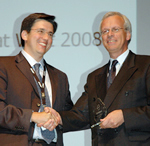The Rodolphe Maheux Award has been instigated to honour a promising, young clinician in the field of endometriosis.
In the spirit of Professor Maheux: the first award was presented in recognition of a team effort!
Lead authors Joas Dias and Sergio Podgaec presented their paper on:
“Time elapsed between the onset of symptoms and the diagnosis of deeply infiltrating endometriosis”
This paper was selected as one of the key abstracts for the clinical plenary session on “Diagnosis of endometriosis”.
Deeply infiltrating endometriosis is related to more intense complaints of symptoms, but it is not possible to assert if this type of disease is an evolution of superficial endometriosis or whether it is a particular phenotype of the disease. In their study, the team from Sao Paulo compared the time elapsed between the onset of symptoms and the diagnosis of endometriosis according to the depth of the lesions.

The team from Sao Paulo: Professor Mauricio Abrao with Drs Joas Dias and Sergio Podgaec
Between 1996 and 2006, 690 patients were fully evaluated and submitted to surgery in the department of Obstetrics and Gynaecology at the University of Sao Paulo, Brazil. Taking potential bias into consideration, 293 were included, ie. women who were undergoing their first endometriosis surgery. They were then divided into two groups: with or without deep endometriosis.
39.2% (115/293) of the women had deep endometriosis, and the mean time elapsed between the onset of symptoms and the diagnosis of endometriosis affecting the rectum, bladder or ureter was 5.21 +/- 5.6 years. This was statistically different than among women without deep endometriosis, where the mean time to diagnosis was 3.9 +/- 4.7 years.
The team therefore concluded that women with deep endometriosis affecting the rectum, bladder or ureter have symptoms for longer until they have a diagnosis and are treated, than those women, who do not have these types of lesions.

